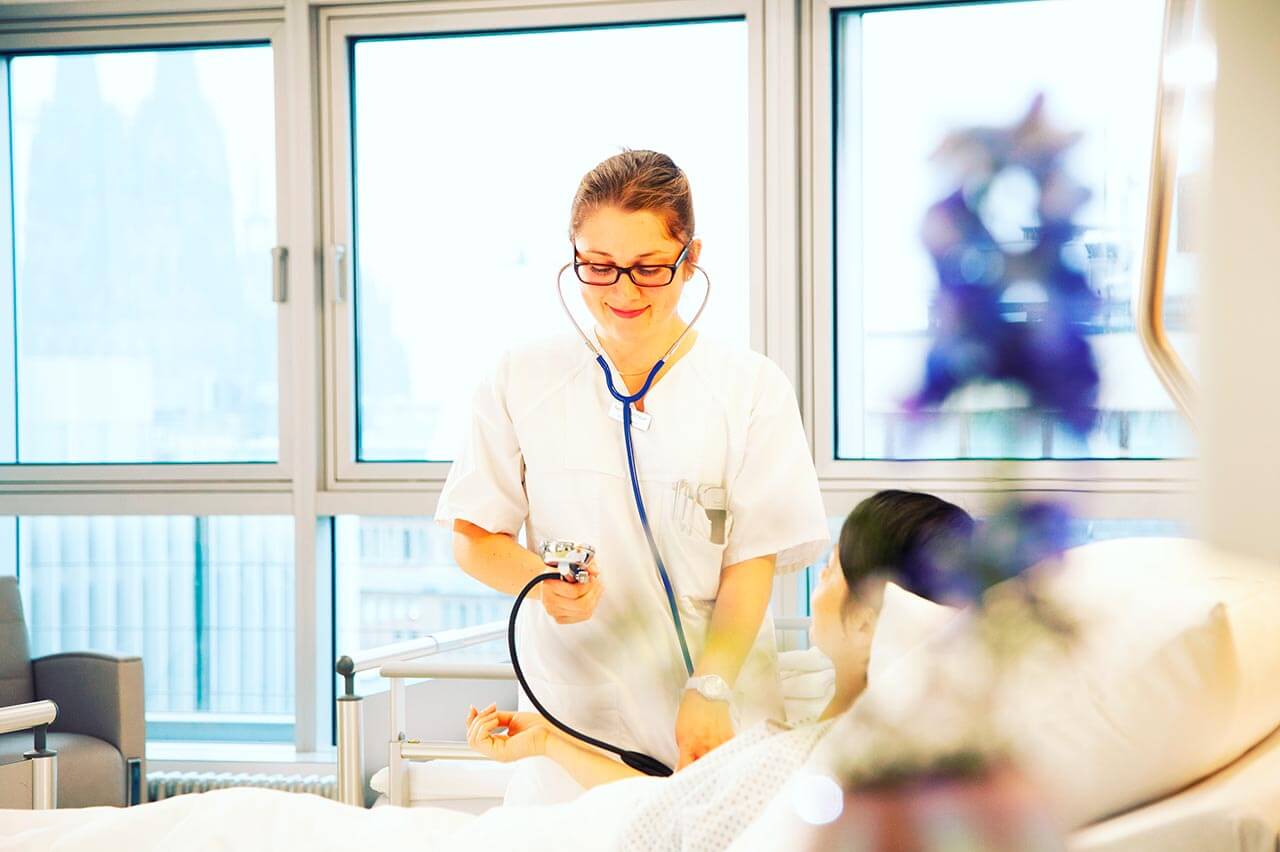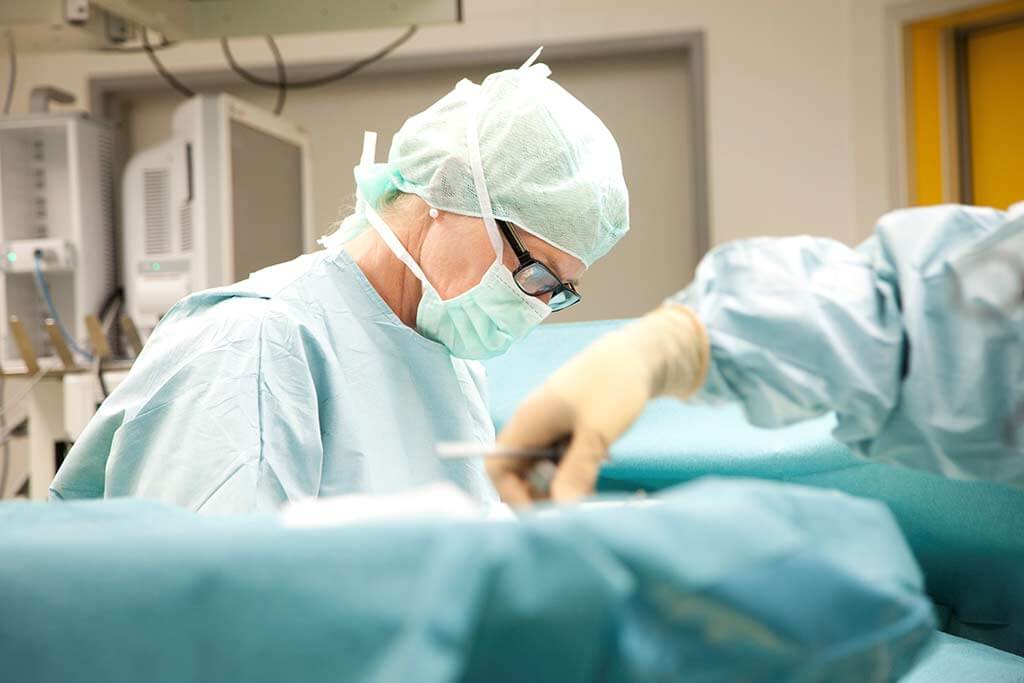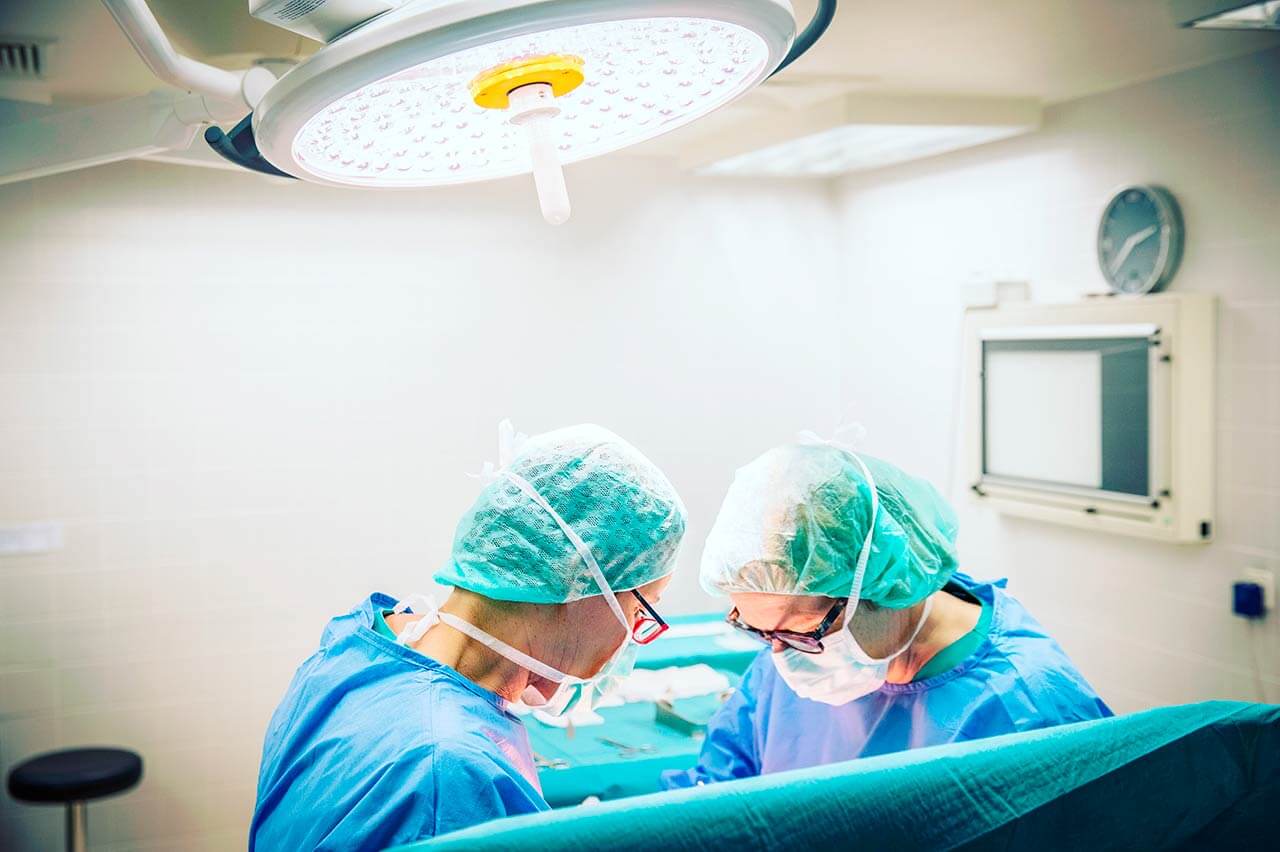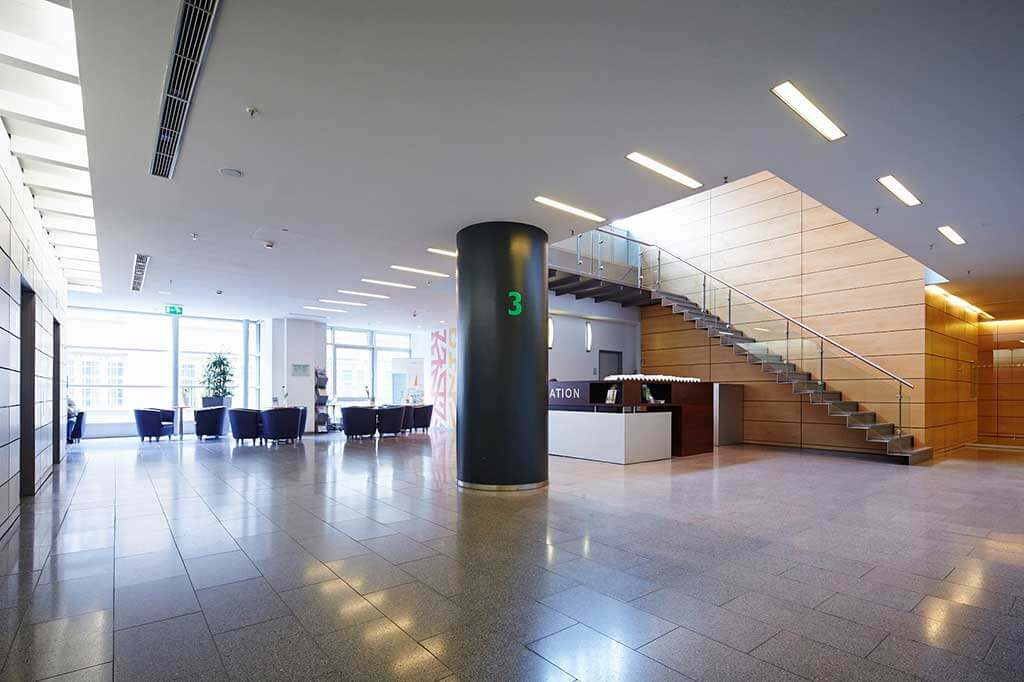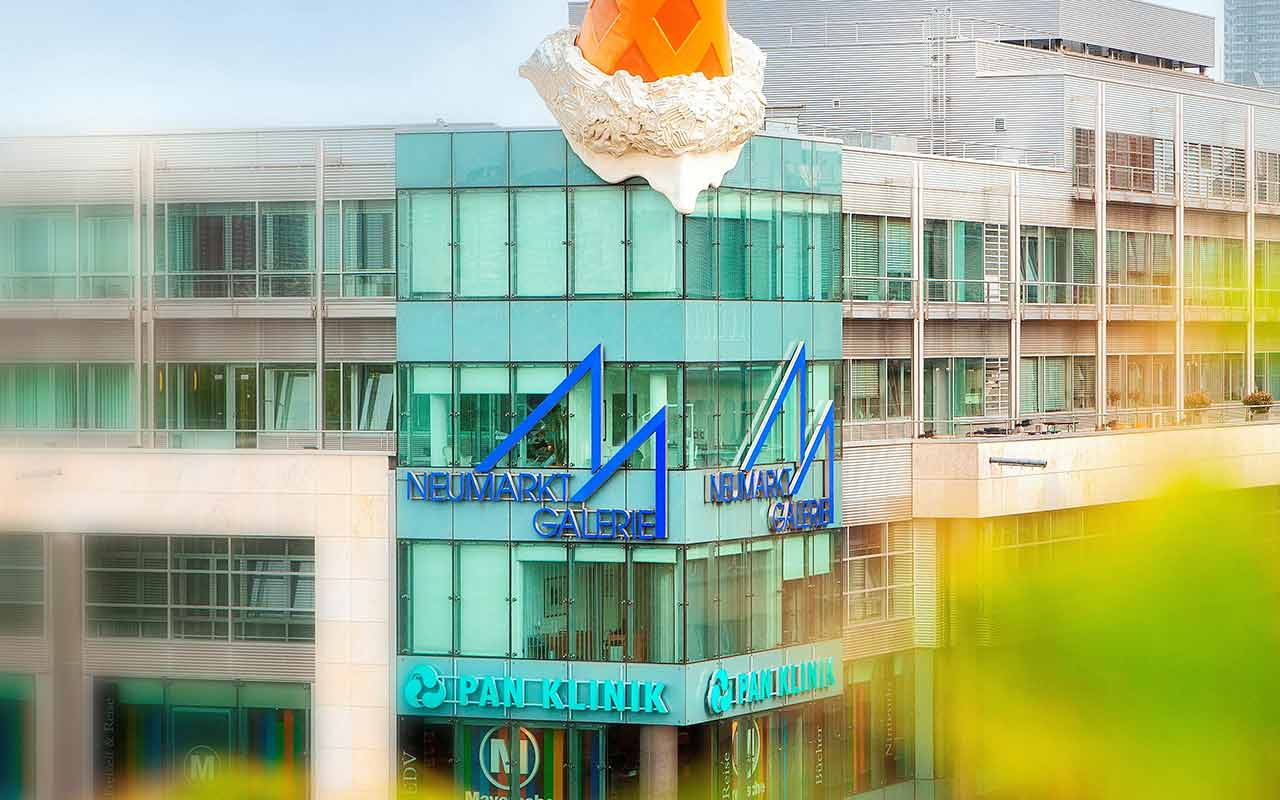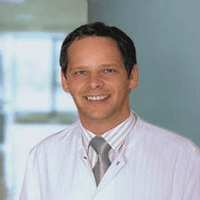
The program includes:
- Initial presentation in the clinic
- clinical history taking
- review of medical records
- physical examination
- dermatological examination
- laboratory tests:
- complete blood count
- biochemical blood analysis
- inflammation indicators (CRP, ESR)
- indicators of blood coagulation
- coagulogram
- D-dimers
- antiphospholipid antibodies (APA)
- antithrombin III
- doppler ultrasound of veins
- venography
- MRI (on indication 1200 €)
- nursing services
- consultation of related specialists
- consultation of the chief physician and all leading experts
- explanation of individual treatment plan
- written statement
Required documents
- Medical records
- Ultrasound scan of the lower extremities vessels (if available)
Service
You may also book:
 BookingHealth Price from:
BookingHealth Price from:
About the department
The Department of Angiology and Vascular Surgery at the PAN Clinic Cologne offers the full range of medical services in the areas of its competence. The department provides diagnostic examinations of the vascular system, as well as conservative and surgical treatment. The patients can also undergo a preventive diagnostic examination to assess the risk of developing vascular pathologies. The department's specialists have vast experience in both classical open and minimally invasive interventions on the arteries, veins and lymphatic vessels. Whenever possible, sparing interventions are used as the first-line treatment, while open surgery is performed only in extremely complex clinical cases. The department's diagnostic facilities and operating rooms are equipped with state-of-the-art devices, so patients can be sure of the high quality and safety of all procedures. The health and well-being of each patient is the main priority for the doctors working in the medical facility, while the basis of clinical practice is an individual approach. The Chief Physician of the department is Dr. med. Stefan Schulte.
The first stage of the therapeutic process is an individual consultation with the attending physician, during which the specialist listens to the patient's complaints and accurately studies his medical history. Based on the clinical data obtained, the patient will be appointed the required complex of diagnostic tests. The main diagnostic method for most vascular diseases is ultrasound scanning, including high-resolution color duplex ultrasonography. The department also provides such diagnostic procedures as light reflection rheography, plethysmography, microcirculation assessment, ankle-brachial index test, etc. All diagnostic procedures are absolutely painless and safe for the patients.
When the diagnosis is made, the doctors elaborate an individual treatment regimen for the patient. Whenever possible, the doctors provide conservative treatment with the help of drugs and lifestyle modifications (refusal of high-fat foods, bad habits, etc.). Nevertheless, many vascular diseases are asymptomatic for a long time and with the onset of the first symptoms conservative methods are already ineffective. In such cases, the specialists of the medical facility prefer sparing minimally invasive operations. Classic open surgery is the last-line therapy when all other methods do not ensure the desired result. Minimally invasive surgical procedures are performed through small skin incisions in the area of the affected vessel. As a rule, such surgical procedures are performed on an inpatient basis under local anesthesia. In most cases, the patient can leave the clinic after 24 hours. Open surgery is performed under general anesthesia, while the period of hospitalization lasts 3-7 days. The department's surgeons also successfully combine minimally invasive and open surgical techniques (hybrid operations).
A special offer of the department is check-up programs to assess the risks of developing vascular pathologies. Since pathological vascular lesions are precursors of such life-threatening diseases as myocardial infarction, stroke, kidney failure, etc., their early detection and treatment avoids irreversible consequences. As a rule, the check-up program includes the study of the patient's medical history, clinical examination, ankle-brachial index test, high-resolution color duplex ultrasonography of the carotid arteries, abdominal aorta, pelvic arteries and arteries of the lower limbs, as well as laboratory tests and venous examinations (if clinically indicated). The check-up programs are intended primarily for the patients with atherosclerosis, stroke and myocardial infarction, circulatory disorders in the family history. In addition, preventive diagnostic examinations are indicated for the patients with arterial hypertension, high blood cholesterol levels, coronary artery disease and/or heart failure, as well as for people suffering from diabetes mellitus and smokers. After receiving the diagnostic results, the specialized doctor holds an individual consultation, during which he discusses them with the patient and, if necessary, recommends further therapeutic measures.
The department specializes in the diagnostics and treatment of the following diseases:
- Varicose veins
- Spider veins
- Deep vein thrombosis
- Carotid artery stenosis
- Aneurysms
- Vascular malformations
- Other vascular pathologies
The department's range of diagnostic and therapeutic services includes:
- Diagnostics
- Ultrasound examinations, including high-resolution color duplex ultrasonography
- Light reflection rheography
- Plethysmography (in case of suspected pulmonary vein occlusion)
- Microcirculation assessment
- Ankle-brachial index test
- Treatment
- Conservative treatment
- Drug therapy
- Infusion therapy for circulatory disorders
- Surgical treatment
- Minimally invasive surgery
- Balloon angioplasty
- Stent implantation
- Stent graft implantation for abdominal aortic aneurysms
- Laser procedures and radio wave therapy for varicose vein treatment
- Sclerotherapy, microsclerotherapy, foam sclerotherapy and stripping for varicose vein treatment
- Placement of port systems and formation of dialysis access
- Open surgery
- Carotid endarterectomy
- Implantation of prostheses for abdominal aortic aneurysms (tubular prosthesis, Y-prosthesis), as well as for aneurysms or occlusions of other blood vessels
- Bypass grafting (using the patient's own veins or prostheses)
- Minimally invasive surgery
- Conservative treatment
- Other medical services
Curriculum vitae
Higher Education and Professional Career
- 1987 - 1995 Study of Medicine at the University of Cologne.
- 1995 - 2002 Postgraduate training in Surgery and Vascular Surgery, Department of General and Vascular Surgery, Traumatology, Hospital Porz am Rhein.
- 1997 Admission to medical practice.
- 1998 Doctorate Degree.
- 2000 Board certification in Surgery.
- 2002 - 2007 Senior Physician in the Department of Surgery at the Hospital Porz am Rhein, then – Managing Senior Physician and Head of the Department of Vascular Surgery.
- 2003 Specialization in Vascular Surgery.
- Since 2006 Permission to carry out postgraduate training in Vascular Surgery.
- 2007 - 2011 Doctor at the Center for Angiology and Vascular Surgery, MediaPark Clinic.
- Since 01.2012 Chief Physician of the Department of Angiology and Vascular Surgery at the PAN Clinic Cologne.
Clinical Interests
- Diagnostics of vascular diseases.
- Treatment of thromboses.
- Minimally invasive surgery for varicose veins (laser therapy, radio wave therapy).
- Surgical interventions on the carotid arteries, aorta and femoral arteries (balloon angioplasty, stent implantation, placement of stent grafts for abdominal aortic aneurysms).
Scientific and Organizational Activities
- General Secretary of the German League for the Fight Against Vascular Diseases.
- Organizational work for the preparation of congresses in vascular surgery (Secretary of the Congress).
- Preparation and holding of conferences on vascular surgery.
- Guidelines for international clinical trials.
- Numerous publications and scientific reports, co-authorship of monographs.
- Participation in the preparation of guidelines for doctors.
Memberships in Professional Societies
- German Society of Surgery (DGC).
- German Society of Vascular Surgery (DGG).
- European Society for Vascular Surgery (ESVS).
- German Society of Phlebology (DGP).
- International Society for Vascular Surgery (ISVS).
- International Society of Endovascular Specialists (ISES).
Photo of the doctor: (c) PAN Klinik
About hospital
The PAN Clinic Cologne is a multidisciplinary medical facility that combines advanced medicine, excellent quality of patient care and a high level of comfort. Founded in 1999, the clinic is located in the very heart of Cologne. During this time, the medical complex has gained long clinical experience, but at the same time it has preserved its primary concept of medical care – high-quality diagnostics and treatment using the achievements of modern medicine.
Today, a huge team of doctors at the clinic admits patients in 25 medical fields, including neurosurgery, neurology, orthopedics, cardiology, gynecology, mammology, urology, endocrinology, plastic surgery, etc. It is worth noting that the clinic employs the best specialists with a wealth of experience and thorough clinical training in the best medical facilities in Germany, other countries of Europe and USA. The clinic's medical team includes many professors who are distinguished by outstanding achievements in the treatment of diseases of a particular profile and who successfully conduct research activities, participate in national and international congresses, symposia and other events.
The clinic annually provides treatment to more than 10,000 patients, and more than 3,000 interventions of varying complexity are performed in its operating rooms. The operating theaters have state-of-the-art technology and equipment for classical open surgery and minimally invasive interventions. In addition, all departments of the medical facility have advanced diagnostic equipment, so that doctors always make the correct diagnosis, which determines the success of subsequent treatment. During the therapeutic process, the specialists strive to choose the most sparing, but at the same time highly effective treatment regimen.
The quality of medical services provided in the clinic is awarded with the prestigious DIN ISO 9001 certification, and therefore patients trust their health to doctors with complete confidence and benefit from the optimal treatment of the European standard.
Photo: (с) PAN Klinik, (c) depositphotos
Accommodation in hospital
Patients rooms
The patients of the PAN Clinic Cologne live in light and cozy rooms with a modern design. A standard patient room includes a comfortable automatically adjustable bed, a bedside table, an air conditioning, a DVD player, a telephone, a TV and a nurse call system. The patient rooms also have Wi-Fi. Each patient room has an ensuite bathroom with shower and toilet. The bathroom also has a hairdryer and towels.
If desired, the patients can live in enhanced-comfort rooms. These patient rooms are distinguished by their more exclusive interiors, as well as beautiful views of the Cologne Cathedral and cityscapes. The bathrooms in these enhanced-comfort facilities include disposable slippers, a bathrobe, towels and toiletries. In addition, the patients living in enhanced-comfort rooms are offered a special menu.
Meals and Menus
The patient and his accompanying person are offered tasty and balanced three meals a day: buffet style breakfast and dinner, as well as lunch consisting of 3-4 courses. If for some reason you do not eat all the foods, you will be offered an individual menu. Please inform the medical staff about your dietary preferences prior to treatment.
Further details
Standard rooms include:
Religion
The religious services are available upon request.
Accompanying person
During the inpatient program, the accompanying person can live with the patient in a patient room or a hotel of his choice. Our managers will help you choose the most suitable option.
Hotel
During the outpatient program, the patient can stay at the hotel of his choice. Our managers will help you choose the most suitable option.
